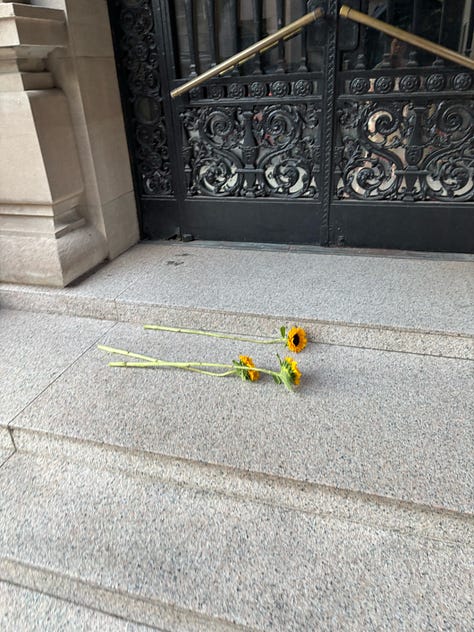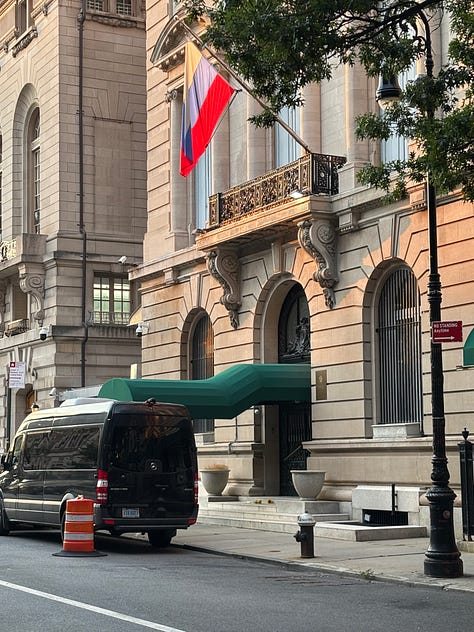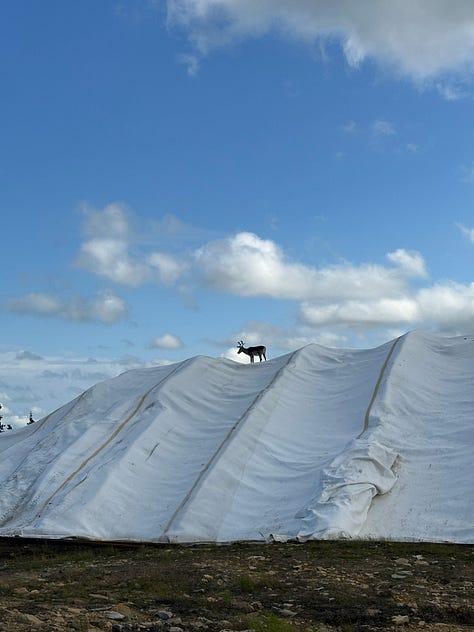Back Among the Conscious
I took a day off for general anaesthesia
Good Morning:



A New York-based sprite of mischief has struck at the Russian consulate in the Manhattan.
If you live in a city with a Russian diplomatic, I highly recommend this course of action. Russian diplomats really hate sunflowers, and leaving sunflowers for them drives them insane:
Monday on #DogShirtTV, the estimable Holly Berkley Fletcher and I finally got to welcome the estimable Anne Applebaum, who recently visited Sudan and had some thoughts to share about the collapse of the liberal world order. Also, Holly had some tales of woe, and I have a barrister’s wig.
Yesterday, there was no show because I was unconscious at showtime as a result of general anesthesia during a minor medical procedure.
The Situation
In Yesterday’s “The Situation” column, I follow up on my recent engagement with the U.S. Secret Service during a chalking operation outside the Russian embassy, arguing that the DC city counsel should change the municipal law in question to allow us all to draw on sidewalks:
While the language’s clear concern is with vandalism, it doesn’t contain any exception for chalk or other harmless, nonpermanent markings. And its language is broad enough to include temporary writing not on buildings or monuments but on streets or sidewalks. Stripping out the superfluous language, the ordinance reads: “It shall be unlawful for any person or persons willfully and wantonly … to write [or] mark ... without the consent ... in the case of public property ... of the person having charge, custody, or control thereof, any word, sign, or figure upon ... any property, public or private.”
A simple fix along the following lines would prevent this law from being used—by federal law enforcement officials, no less—to prevent political expression or to prevent children from drawing butterflies or writing their names in front of their houses. “Nothing in this section shall be read to prevent the application of calcium carbonate, dyed or otherwise, to public thoroughfares for purposes of political or artistic expression.”
Why is this change important? In the grand scheme of things, it’s not.
But Washington, D.C., is currently under federal occupation, and there are only a limited number of ways in which the city government can fight back. Clarifying that citizens of D.C. can lawfully write on their sidewalk or the streets—those in front of their houses, those in front of embassies, and those in front of the White House—their feelings about ICE, the National Guard deployment, the situation in Gaza, abortion, or the president’s meeting in Alaska with the Russian dictator is a matter it can address.
Recently On Lawfare
Compiled by the estimable Mary Ford
Give Peace a Chance: The Post-Alaska Path to Ending the Russia-Ukraine War
Mykhailo Soldatenko—in anticipation of Ukrainian President Volodymyr Zelensky’s meeting with President Trump in the Oval Office —examines three issue areas Ukraine and its Western partners should weigh following the Alaska summit with Russian President Vladimir Putin: a ceasefire versus a peace agreement, varying territorial demands, and security guarantees for Ukraine.
President Zelensky and several European leaders are scheduled to meet President Trump in the White House on Monday afternoon to discuss further course of action in the negotiations. It is imperative for all involved to get the most from the White House meeting and not to repeat the previous Oval Office fiasco. Although an unacceptable deal—especially one that is borderline capitulation—would be a disaster for Ukraine, no agreement at all would also constitute a bad outcome under the circumstances. Recent polls show that the majority of Ukrainians desire a negotiated end to the war, but, at the same time, are not ready to capitulate to the Russian maximalist demands. The goal should be to come up with a negotiation strategy that would increase chances of an acceptable negotiated settlement and allow Ukraine to emerge from the war as an independent, secure and prosperous democracy. Many argue that the chances of reaching an agreement are slim, but it is worth giving it a chance.
District of Columbia v. Trump: A Hearing Diary
Anna Bower chronicles the temporary restraining order hearing before Judge Ana Reyes in District of Columbia v. Donald J. Trump—a suit over President Trump’s attempts to seize control of the Metropolitan Police Department and install an “emergency police commissioner” to direct District policing.
During the hearing, Judge Reyes heard argument on several aspects of an order that was issued by Attorney General Pam Bondi on Aug. 14. The judge initially indicated that she was inclined to partially block Bondi’s order. Following a brief recess, however, the parties said that they were working to re-write three sections of the order that purport to revoke local policies that apply to the Metropolitan Police Department. They asked the judge to withhold ruling on those sections until next week.
Digital Rights in Armed Conflict and the Ukraine v. Russia Decision
Deborah Housen-Couriel and Asaf Lubin analyzes the European Court of Human Rights’s decision in Ukraine and the Netherlands v. Russia. Housen-Couriel and Lubin explain that the decision—which found Russia responsible for a vast array of human rights violations—recognizes that the right to privacy applies during war, significantly limiting the ability of militaries to collect data in the age of digital conflict.
With this judgment, the court has marked a watershed moment in international law. For the first time since the Wall Advisory Opinion by the International Court of Justice (ICJ), an international judicial body has unequivocally recognized that the right to privacy applies during armed conflict and times of occupation. But more fundamentally, and unlike the ICJ, the ECtHR has gone further by clarifying that the right to privacy imposes specific legal and administrative constraints on military data collection programs. The decision therefore embeds digital rights protection within the very structure of the laws of war, and does so at a time when warfare is increasingly waged through the ubiquitous targeting and use of computerized networks, software code, and the digital data of both combatants and civilians.
The West is Helping Syria Build a Government No Minority Wants to Join
In the latest installment of Lawfare’s Foreign Policy Essay series, Haddon Barth raises the alarm over Syrian President Ahmed al-Shaarma’s exclusion of key political parties from the country’s new ruling coalition, and suggests the West use its leverage over Damascus to encourage the creation of a more representative political authority.
The current escalation reflects the repercussions of the West’s chosen course. Since lifting sanctions in June, the United States and European Union have embraced the transitional government in Damascus, ignoring its consolidation of power. The consequences of this policy have now come home to roost: The transitional government has established a political order in Syria that no minority group would willingly join. Moving forward, if Washington and Brussels wish for the political factions in the northeast to peacefully integrate, they must first use their influence with Damascus to demand a more inclusive political system.
Back Into the Abyss: Israel’s Government Fires Attorney General, Supreme Court Blocks the Move
Yuval Shany and Amichai Cohen—following the Israeli government’s unanimous decision to remove Attorney General (AG) Gali Baharav-Miara from office—break down Baharav-Miara’s clashes with Israeli ministers, and emphasize that firing the AG not only represents an attack on the rule of law, but threatens a full-fledged constitutional crisis.
Most likely, the High Court of Justice will strike down the government’s decision to remove the AG. Even the more conservative justices, preaching judicial restraint, will find it hard to accept such an aggressive abuse of authority, which involves a real-time change of the rules of the game and a frontal assault on the independence of the most important gatekeeper in Israel’s legal system. We are anxious, however, that several members of the government might declare in response to such a decision that they refuse to accept the legitimacy of the continued service of the AG. Indeed, there have already been calls by some ministers to stop inviting her to government meetings. This will set in motion a full-blown constitutional crisis, to which the Karhi letter and Levin’s changing of the locks are merely harbingers.
The Clock Is Ticking on Critical Authorities to Compete With China
Rush Doshi and William Henagan argue that Congress and the executive branch must work together to reauthorize critical foreign and domestic instruments of statecraft, such as the Defense Production Act, or risk losing state capacity and falling behind China technologically and economically.
China can build its tools of strategic competition unencumbered by the rule of law or congressional consultation. Its speed can provide an advantage, but only if the U.S. allows it, instead of self-sabotaging existing capabilities or failing to invest in their evolution. State capacity—much like industrial capacity—requires material and temporal investment. And it can take years to rebuild once it is lost.
Podcasts
On Lawfare Daily yesterday, I sat down with Anastasiia Lapatina, Eric Ciaramella, and Mykhailo Soldatenko to discuss President Trump and Russian President Vladimir Putin’s meeting in Alaska, Trump’s meeting with Ukrainian President Volodymyr Zelensky and several other European leaders in the Oval Office on Monday, and what this all means for the future of the Russia-Ukraine war.
Here’s video of that conversation:
On Scaling Laws, Janet Egan, Peter E. Harrell, and Sam Winter-Levy join Alan Rozenshtein to take stock of Trump’s recent deal with chip manufacturers Nvidia and AMD, the statutory and constitutional validity of the deal, the risks of allowing China to acquire powerful chips from these companies, and more.
On Monday on Lawfare Daily, I sat down with Anna Bower, Roger Parloff, and Chris Mirasola to discuss Trump’s attempt to seize control of the Metropolitan Police Department, the bench trial in Newsom v. Trump, and litigation over freezing federal funds:
Documents
Mary Ford shares the text of the State Department’s 2024 Country Reports on Human Rights Practices.
Today’s #BeastOfTheDay, nominated by the estimable Minna Ålander, is the reindeer, seen here beating the heat in Lapland by hanging out on a pile of snow under a tarp:
Writes Minna: “It is still pretty warm in Lapland (22 degrees celsius), so the reindeer like to cool down by chilling on the heaps of snow that have been conserved from last winter.”



In honor of today’s Beast, don’t be ashamed to crank up your AC. Even the reindeer needs to cool down.
Keep reading with a 7-day free trial
Subscribe to Dog Shirt Daily to keep reading this post and get 7 days of free access to the full post archives.




